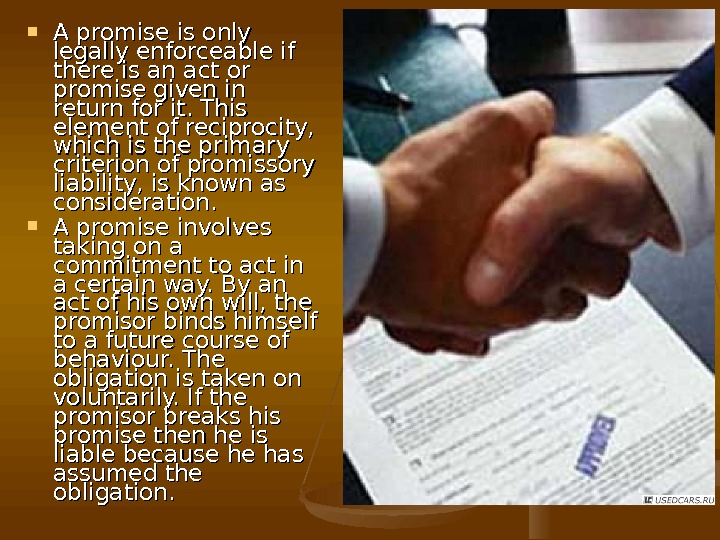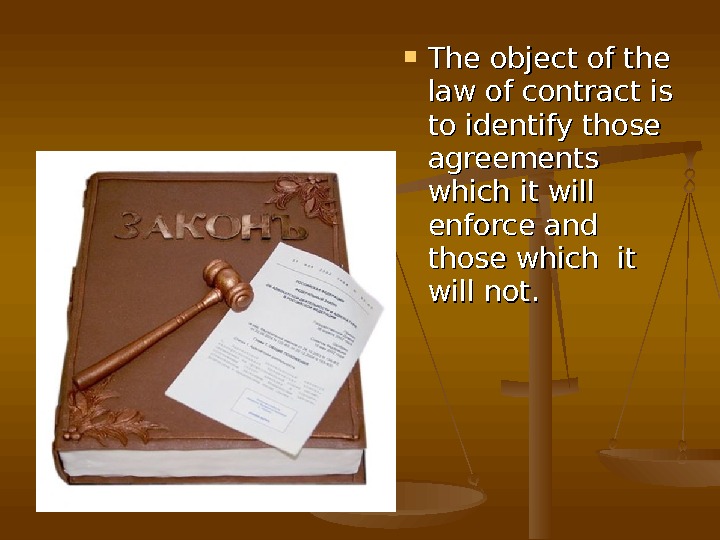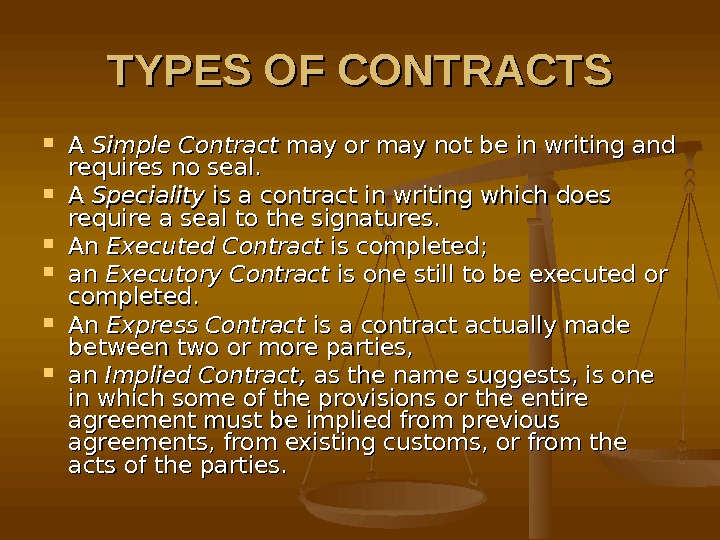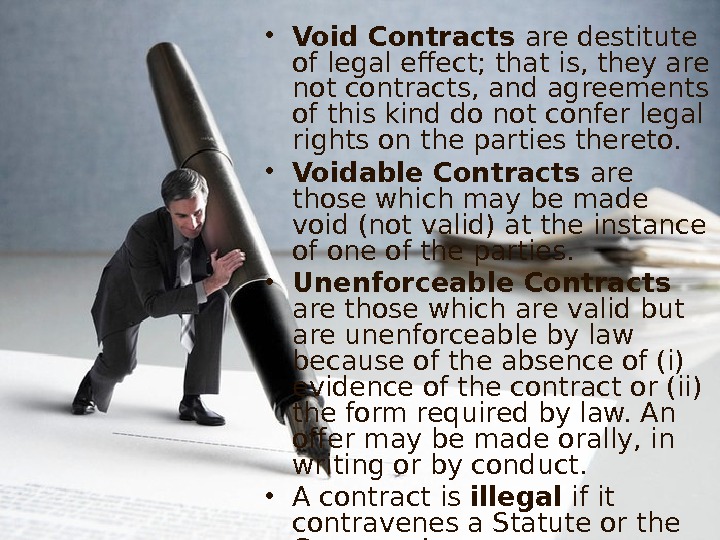Law of contract A contract is










- Размер: 1.1 Mегабайта
- Количество слайдов: 9
Описание презентации Law of contract A contract is по слайдам
 Law of contract
Law of contract
 A contract is simply an agreement which can be enforced through the courts. The law treats agreement as the essential principie around which economic and social life is based.
A contract is simply an agreement which can be enforced through the courts. The law treats agreement as the essential principie around which economic and social life is based.
 A promise is only legally enforceable if there is an act or promise given in return for it. This element of reciprocity, which is the primary criterion of promissory liability, is known as consideration. A promise involves taking on a commitment to act in a certain way. By an act of his own will, the promisor binds himself to a future course of behaviour. The obligation is taken on voluntarily. If the promisor breaks his promise then he is liable because he has assumed the obligation.
A promise is only legally enforceable if there is an act or promise given in return for it. This element of reciprocity, which is the primary criterion of promissory liability, is known as consideration. A promise involves taking on a commitment to act in a certain way. By an act of his own will, the promisor binds himself to a future course of behaviour. The obligation is taken on voluntarily. If the promisor breaks his promise then he is liable because he has assumed the obligation.
 Contractual agreements give rise to rights and obligations which the law recognizes and enforces. But certain agreements, such as domestic and social arrangements, are not intended by the parties to be legally binding.
Contractual agreements give rise to rights and obligations which the law recognizes and enforces. But certain agreements, such as domestic and social arrangements, are not intended by the parties to be legally binding.
 The object of the law of contract is to identify those agreements which it will enforce and those which it will not.
The object of the law of contract is to identify those agreements which it will enforce and those which it will not.
 TYPES OF CONTRACTS A A Simple Contract may or may not be in writing and requires no seal. A A Speciality is a contract in writing which does require a seal to the signatures. An An Executed Contract is completed; an an Executory Contract is one still to be executed or completed. An An Express Contract is a contract actually made between two or more parties, an an Implied Contract, as the name suggests, is one in which some of the provisions or the entire agreement must be implied from previous agreements, from existing customs, or from the acts of the parties.
TYPES OF CONTRACTS A A Simple Contract may or may not be in writing and requires no seal. A A Speciality is a contract in writing which does require a seal to the signatures. An An Executed Contract is completed; an an Executory Contract is one still to be executed or completed. An An Express Contract is a contract actually made between two or more parties, an an Implied Contract, as the name suggests, is one in which some of the provisions or the entire agreement must be implied from previous agreements, from existing customs, or from the acts of the parties.
 An agreement will be enforced when the following essential elements exist: (a) Offer and Acceptance. There must be an offer by one party and an acceptance of it by the other. (b) Intention to create legal relations. (c) Capacity of the parties. Each party must have the legal capacity to make the contract. (d) Consent must be genuine. The consent must not be obtained by fraud, or duress, for example. (e) Consideration must be present (except in contracts under seal, i. e. by deed). (f) Legality of object. The object of the contract must not be one of which the law disapproves. (g) Possibility of performance.
An agreement will be enforced when the following essential elements exist: (a) Offer and Acceptance. There must be an offer by one party and an acceptance of it by the other. (b) Intention to create legal relations. (c) Capacity of the parties. Each party must have the legal capacity to make the contract. (d) Consent must be genuine. The consent must not be obtained by fraud, or duress, for example. (e) Consideration must be present (except in contracts under seal, i. e. by deed). (f) Legality of object. The object of the contract must not be one of which the law disapproves. (g) Possibility of performance.
 • Void Contracts are destitute of legal effect; that is, they are not contracts, and agreements of this kind do not confer legal rights on the parties thereto. • Voidable Contracts are those which may be made void (not valid) at the instance of one of the parties. • Unenforceable Contracts are those which are valid but are unenforceable by law because of the absence of (i) evidence of the contract or (ii) the form required by law. An offer may be made orally, in writing or by conduct. • A contract is illegal if it contravenes a Statute or the Common Law.
• Void Contracts are destitute of legal effect; that is, they are not contracts, and agreements of this kind do not confer legal rights on the parties thereto. • Voidable Contracts are those which may be made void (not valid) at the instance of one of the parties. • Unenforceable Contracts are those which are valid but are unenforceable by law because of the absence of (i) evidence of the contract or (ii) the form required by law. An offer may be made orally, in writing or by conduct. • A contract is illegal if it contravenes a Statute or the Common Law.
 To sum up i n Russia, contract law is a sub-sector of civil law, a set of legal rules governing civil liability. Contracts govern the agreement between the natural and legal persons, and provide a legitimate trade in the country.
To sum up i n Russia, contract law is a sub-sector of civil law, a set of legal rules governing civil liability. Contracts govern the agreement between the natural and legal persons, and provide a legitimate trade in the country.

